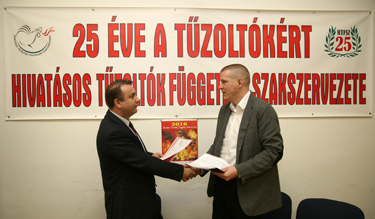There are a lot of uncertainties about the implementation of the new law (entering into force on 1 July) under which chimney sweeping will fall under the scope of disaster management.
Chimney sweepers still do not know how many sweepers and under what conditions the disaster management authority would like to take over. Many fear that they will lose their jobs from July if the National Directorate General for Disaster Management decides to render part of the service by the 400 firefighters under retraining at present.
With regard to the uncertain situation, Lajos Galambos, president of the Independent Trade Union of Professional Firefighters (HTFSZ) and Csaba Vámos, president of the Hungarian Chimney Sweepers’ Union (KOSZ) signed a cooperation agreement on 15 February in Budapest. The basis of the cooperation between the two unions is mutual solidarity, representation of the common interests of the members and mutual assistance.
At present, there are approximately one thousand chimney sweepers in Hungary but it is not yet known how many people the disaster management authority would like to employ after the law enters into force.
Firefighters receive training on chimney sweeping
Meanwhile, the disaster management have started to survey how many professional firefighters are willing to undertake a second job as chimney sweepers after obtaining the necessary qualification. The training is launched by the Training Centre of the National Directorate General for Disaster Management.
Lajos Salamon, president of HTFSZ said at the press conference following the conclusion of the cooperation agreement that although the vocational training of 400 firefighters would start in the near future, the applicants do not know about the working time, working conditions, location and remuneration of their future second job.
Csaba Vámos, president of KOSZ expressed the hope that they would have more information in a short time as the National Directorate General for Disaster Management promised to organise a technical info forum for the chimney sweepers.
Pending questions
The draft proposal on the new supervisory authority of chimney sweeping was elaborated last December.
„We have to detect carbon monoxide leaks of closed combustion heaters, measure carbon monoxide emission and permeability. In case of solid fuels, combustion products should be removed from the chimney, the condition of the chimney should be inspected, the precedents, such as boiler replacements, should be explored”, explained Róbert Kin who has been working as a chimney sweeper for fifteen years. According to him the profession requires lifelong learning as chimney sweeping involves a great deal of responsibility; human lives are at stake when maintenance and licencing is not performed with adequate professionality and expertise.
As of July, chimney sweeping will be free of charge for residential customers and in settlements where the local municipality terminates the contract with the previous service provider, the service will be rendered by the Disaster Management. According to Lajos Salamon, president of the Firefighters’ Union, the details have not been clarified so far, the future working conditions of the professional staff of Disaster Management are not known. So far, 420 firefighters applied for second jobs as chimney sweepers.
„The most relevant information would be about the framework of the job: for example, who will reimburse the travel costs, will our colleagues be entitled to use official cars or will they have to use their own vehicles? What about the working time? Who will supply the equipment? And last but not least, our colleagues would like to know about the wages”, said Mr Salamon.
Chimney sweepers fear that they will lose their jobs. “And indeed, their fears are well-founded as firefighters might replace them”, said Csaba Vámos, president of the National Trade Union of Chimneysweepers.
So far, 15 counties have indicated that they would transfer chimney sweeping to the Disaster Management. Jenő Schmidt, president of the National Association of Municipalities said: “The Hungarian state will pay for the service from the taxpayers’ money only to the Disaster Management. So even if we had kept any of our companies we should have financed it from the municipality budget. It would increase our expenditure and we do not have the necessary revenues.”
The president of the Association of Municipalities is on the opinion that ninety percent of the chimney sweepers will lose their jobs.

